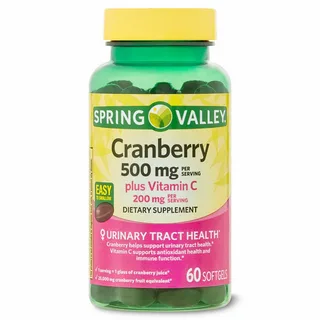Cranberries, small red berries native to North America, have long been valued for their potential health benefits. Cranberry supplements, typically derived from the fruit or extract, offer a convenient way to harness the nutritional properties of cranberries. Known for their high content of antioxidants, particularly proanthocyanidins, cranberry supplements have been studied for their potential to support urinary tract health, promote heart health, and boost immune function. This comprehensive guide explores the extensive advantages of cranberry supplements, covering their mechanisms of action, scientific evidence, and practical considerations for those interested in incorporating them into their health regimen.
Mechanisms of Action
Cranberry supplements contain bioactive compounds such as proanthocyanidins, flavonoids, and organic acids, which contribute to their health-promoting properties. Proanthocyanidins, in particular, are thought to inhibit the adhesion of bacteria, including Escherichia coli (E. coli), to the urinary tract lining, thereby reducing the risk of urinary tract infections (UTIs). Additionally, cranberry supplements may possess antioxidant and anti-inflammatory effects, helping to protect cells from oxidative damage and reduce inflammation throughout the body. These mechanisms of action underlie the potential health benefits associated with cranberry supplementation.
Urinary Tract Health
One of the primary benefits of cranberry supplements is their ability to support urinary tract health and reduce the risk of UTIs. UTIs, which occur when bacteria infect the urinary tract, are a common and often recurring condition, particularly in women. Cranberry supplements are believed to help prevent UTIs by preventing bacteria from adhering to the urinary tract lining, making it more difficult for them to cause infection. Numerous studies have investigated the effectiveness of cranberry supplementation in reducing UTI recurrence, with some demonstrating significant reductions in UTI incidence, particularly in susceptible populations such as women with a history of recurrent UTIs.
Heart Health
Cranberry supplements may offer benefits for heart health, primarily due to their antioxidant and anti-inflammatory properties. Oxidative stress and inflammation are key contributors to cardiovascular disease, including atherosclerosis (hardening of the arteries) and coronary artery disease. Cranberry supplements, rich in antioxidants such as proanthocyanidins and flavonoids, help neutralize free radicals and reduce inflammation, thereby protecting against heart disease. Some research suggests that cranberry supplementation may improve various risk factors for heart disease, including blood pressure, cholesterol levels, and arterial stiffness, although further studies are needed to confirm these effects.
Immune Function
Cranberry supplements may also support immune function and help defend against infections due to their antimicrobial and antioxidant properties. The compounds found in cranberry supplements, including proanthocyanidins and flavonoids, exhibit antimicrobial activity against a wide range of bacteria and viruses, including those that cause respiratory infections and gastrointestinal illnesses. Additionally, cranberry supplements may help modulate the immune response, enhancing the body’s ability to fight off infections and maintain overall immune health. While more research is needed to fully understand the impact of cranberry supplementation on immune function, preliminary evidence suggests that it may play a beneficial role in supporting the body’s natural defenses.
Practical Considerations and How to Take Cranberry Supplements
Cranberry supplements are available in various forms, including capsules, tablets, powders, and liquid extracts. The appropriate dosage of cranberry supplements may vary depending on individual health needs and the specific product. It’s essential to follow the recommended dosages provided by supplement manufacturers or consult with a qualified healthcare professional for personalized guidance.
While cranberry supplements are generally considered safe for most individuals when taken as directed, some people may experience side effects such as gastrointestinal upset or allergic reactions. Pregnant and breastfeeding women, individuals with certain medical conditions (such as kidney stones or allergies to aspirin), and those taking medications should exercise caution and consult with a healthcare provider before using cranberry supplements. Additionally, cranberry supplements may interact with certain medications, particularly blood thinners and medications for diabetes, so it’s important to seek medical advice before starting supplementation.
Conclusion
Cranberry supplements offer a range of potential health benefits, including support for urinary tract health, heart health, and immune function. With their well-established mechanisms of action and growing scientific evidence, cranberry supplements stand as a valuable option for individuals seeking natural remedies to support overall health and well-being. By incorporating cranberry supplements into their health regimen, individuals can harness the antioxidant, antimicrobial, and anti-inflammatory properties of cranberries to promote vitality and well-being. However, it’s essential to use cranberry supplements responsibly and in conjunction with a balanced diet and lifestyle to maximize their effectiveness and ensure optimal health outcomes.
- Exploring the Top CBD Edibles A Comprehensive Review By Vapes Super Store - April 9, 2024
- Benefits of Cranberry Supplements - April 2, 2024
- Benefits of Collagen Supplements - April 2, 2024

